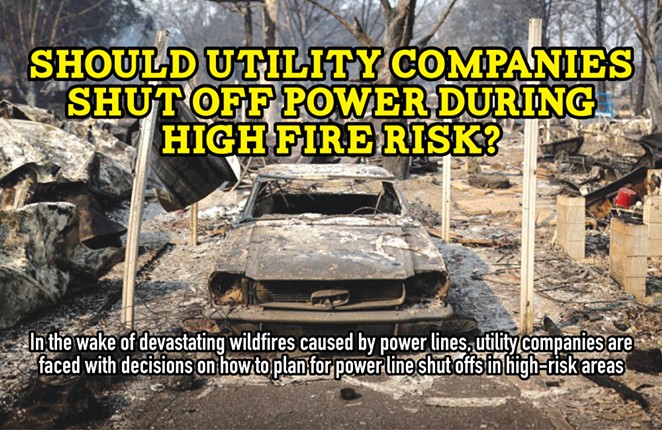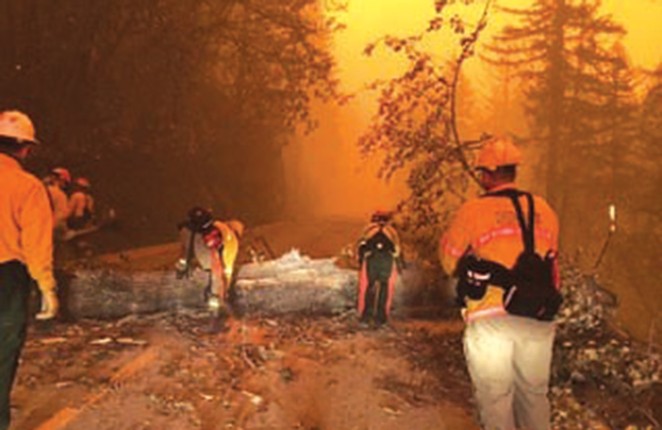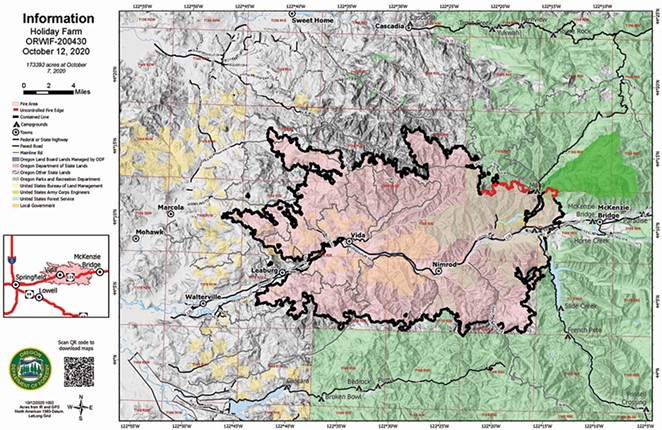Angela Spencer grew up in Springfield, Oregon. Her parents Bob and Linda Spencer owned property on the McKenzie River, where they both lived and ran their fishing and rafting business. In September of 2020, the Spencer family lost their home and business in the 173,393-acre Holiday Farm Fire.
While the Spencers were lucky enough to escape, the fire caused major loss for the family, burning their home and business and devastating the community. The Spencers were eventually able to return to their property and rebuild, however, that wasn't the case for many of their neighbors.
"Its been difficult because a lot of neighbors didn't have insurance, so a lot of people lost everything with nothing returned," said Angela Spencer. "A lot of people had to move out of the community."
Bob and Linda Spencer waited two and a half years to rebuild the place they had called home for so many years. The couple worked with the Federal Emergency Management Agency and lived in a government trailer while they rebuilt. Angela Spencer said her parents are grateful that they stayed in their community; something many residents were unable to do.
Utility companies plan for shutoffs
The Holiday Farm Fire, also known as the McKenzie River Fire, started on Sept. 7, 2020, about 3 miles west of McKenzie Bridge. The fire, according to a report from FEMA, wasn't fully contained until Oct. 29. The fire damaged or destroyed many homes and businesses throughout the area.
In 2020, Oregon had several large fires across the state that bruned over 1 million acres, which was twice the 10-year average.
The community is still picking up the pieces, according to Marc Brooks, the executive director of Cascade Relief Team, a crisis-driven organization that provides services and resources to communities.
In the beginning, residents and authorities were uncertain what had caused the enormous wildfire. Early reports from locals suggested that sparking power lines started the fire. Several law firms today are still offering legal representation after "power company negligence" for people affected by the 2020 fire.
A similar investigation is underway in Maui following the severe wildfires that started in August. An article from "The Washington Post" revealed that a security video, recorded on the night of Aug. 7, evidenced the first flames, showing bright flash in the trees that experts said looks like a sparking power line.
With the growing concern and attention regarding power lines igniting wildfires, utility companies are working to adapt and plan for situations that give them a tough decision to make— whether to shut down power lines during high risk of fire.
Pacific Power is a utility company that serves most of Deschutes County and many other regions. Simon Gutierrez, an Oregon spokesperson for Pacific Power, said the company created a, "robust Wildfire Mitigation Plan that's been in place since 2019 that is designed to minimize the risk of our equipment potentially igniting a wildfire."
In 2019, Governor Kate Brown recommended that utilities prepare risk-based wildfire procedures in a report on wildfire response. Brown then issued an Executive Order 20-04 in 2020, which in paragraph 5B, directed the Public Utilities Commision to evaluate utility protection plans, leading to Public Safety Power Shutoff requirements.
Pacific Power complied with the requirements, putting in place a formal plan for PSPS, which is a temporary measure that deenergizes lines to keep people and communities safe.
"As extreme weather increasingly occurs throughout our service area, we have the forecasting power and flexibility to enact a Public Safety Power Shutoff in any part of our service area where it's necessary to keep customers and communities safe. In the event of a PSPS, customers are notified well in advance," Gutierrez told the Source Weekly in an email.
Gutierrez said the company has invested hundreds of millions of dollars into system hardening, vegetation management and situational awareness tools. According to Gutierrez, the utility company would consider shutting off power when extreme weather such as high wind, in conjunction with low humidity and dry fuels, are forecasted.
Central Electric Cooperative is another utility company in Central Oregon, serving a 5,300-square mile territory including Deschutes, Crook, Jefferson and parts of Lake, Linn, Wasco and Grant counties. The company formalized an existing Wildfire Mitigation Plan in 2020.
The plan details its programs to adapt its electrical system by implementing technology to detect issues before they come up and enhancing operational practices to decrease the potential of ignitions.
In 2021, CEC added a PSPS plan which would shut off power to reduce the threat of wildfires in certain weather conditions. Several variables could influence CEC's decision to shut off power, according to Courtney Cobb, the communications coordinator for CEC, including a Red Flag Warning issued in high-risk wildfire areas, such as the area of Sisters to Black Butte and Camp Sherman.
During times of high winds, high heat and low humidity, CEC also deploys its service personnel to the areas to monitor and assess weather conditions. In the event of a PSPS, Cobb said that CEC would attempt to notify its members 24-72 hours prior to shutting off power if it has enough notice.
"The cooperative is dedicated to the safety and reliability of its electric system and conducts ongoing visual and structural inspections, vegetation management, and system upgrades to help reduce the risk of its electric equipment contributing to the ignition of a wildfire," said Cobb.
Energized power lines spark concerns
Wildfires caused by power lines are often due to high wind, equipment failure or contact with vegetation, people or animals. Oftentimes, winds can cause debris in areas of high vegetation to make contact with a power line. Wind can also cause surrounding trees to fall on a power line or cause power lines to fall on surrounding debris, sparking a fire.
Javad Mohammadi, an assistant professor at the University of Texas who specializes in building energy and environments, said there are a lot of factors for utility companies to consider when deciding whether to shut off power.
"When you shut down power, you're going to impact not only electricity usage, but also other systems that depend on it," said Mohammadi. "There are many things that will be impacted if you shut off power, so that's a big consideration."
People with medical needs that depend on electricity for their equipment can be harmed without power. Another consideration is power availability for A/C and fans during heat waves, which are often associated with wildfire risk.
Mohammadi recommends investing in more off-grid electric infrastructure, adding more energy storages and solar panels. "The more options we have for providing electricity for our communities, the less dependent people would be on the main grid," said Mohammadi. "So, if in those scenarios when you have to shut off power, you have other means to provide some basic services, and that would be very helpful."
According to a report from the Oregon Public Utility Commission, underground power lines can reduce fire risk, however, Mohammadi believes this solution is not practical. While some utility companies have started investing in this fire prevention tactic, it's a large investment of both time and money. Underground lines are far more expensive than overhead lines, especially in more rural areas of the West.
The best way to mitigate power line fires, according to Mohammadi, is the placement of power lines, making sure they're not surrounded by dry brush and trees, and more robust vegetation management around them.
With the changing climate and a lack of vegetation management, Mohammadi believes these types of fires will keep happening more and more. It's ultimately left to the utility companies, Mohammadi said, to keep their systems updated, have proper protocols and work to increase vegetation management.
Holiday Farm Fire recovery
Cascade Relief Team helped clean up about 30 properties in Blue River after the Holiday Farm Fire. In that area of Blue River, which was one the areas hit hardest by the Holiday Farm Fire, Brooks at Cascade Relief said many residents left and didn't come back. "They haven't really recovered or rebuilt; they are in the process of it."
Brooks believes that in addition to utility companies monitoring its power lines, communities should increase programs that allow organizations, like Cascade Relief Team, to help people who may not be able to go without power for several days.
"I think [power companies] are running more cautious than they ever have," said Brooks. "I think that nobody wants another 2020, and I think they are doing a better job at shutting down power."
Fire recovery takes time, said Brooks, and he hopes that communities will continue to spread awareness of the time, energy and resources it takes communities to recover after a deadly wildfire.
"The effects on the McKenzie and the Holiday Farm Fire, that's going to be seen for 20 years plus, just because of how hard it is for people to get back home," said Brooks. "Groups like ours and others are doing everything they can to help bring people back to the McKenzie or other parts of Orgon that we serve."
Bob and Linda Spencer are now living in their rebuilt property on the McKenzie River. Angela Spencer currently lives in Southern California but plans to move back home in the next few months. It's been three years, and while the Spencers' house is rebuilt and their business is back up and running, Angela Spencer said her parents are still getting settled.

























